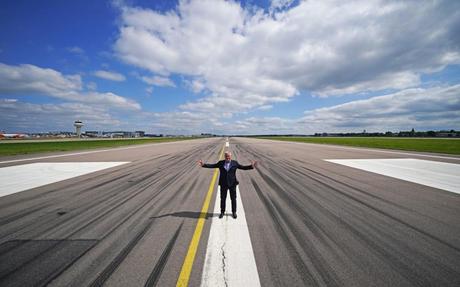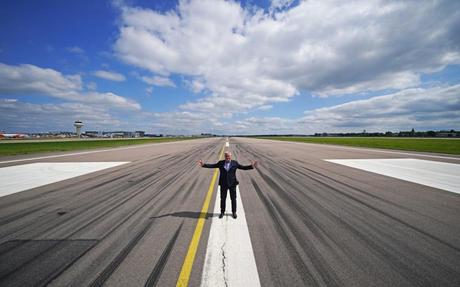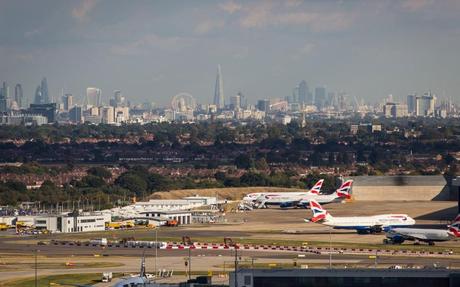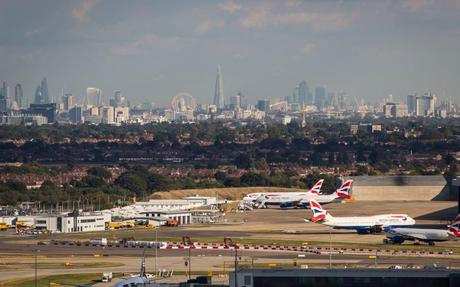Rishi Sunak's tourist tax has put Gatwick at a "competitive disadvantage" against its rivals abroad, the airport's chief executive has said.
Stewart Wingate, who has been at the helm of Britain's second-largest airport since 2009, said the abolition of duty-free shopping had hampered Gatwick's ability to attract wealthy passengers and long-haul airlines from abroad.
He told The Telegraph that the tourist tax is holding back the hub's drive for growth, especially as Gatwick vies to compete with European rivals including Madrid, Milan and Paris.
Mr Wingate is the youngest senior business leader to weigh in on the debate surrounding the government's abolition of duty-free shopping for tourists in 2020, which made goods 20% cheaper.
"Our position is that, alongside London and the South East, we are at a competitive disadvantage because when passengers think where should I go and which city should I choose, part of the decision-making is whether they can shop duty free. " he said.
"Some of these passengers want to purchase significant quantities of goods. But if you want to come to the heart of London and buy luxury goods, you might think twice."
Fresh criticism of the tourist tax, first voiced by Mr Sunak when he was chancellor in 2020, could reignite the debate as the Tories and Labor look to win over business ahead of the general election.
Mr Wingate added: "We will continue to say, whoever the government is, that we feel we are at a disadvantage compared to other capitals."
It comes as Gatwick pursues its biggest expansion project in decades, with a price tag of £2.2 billion.
The London travel hub, which registered 41 million passengers in 2023, is seeking to expand its operations by converting its emergency runway into a regular runway, paving the way for more flights and passengers.
According to Mr Wingate and Gatwick's planning application, this would be achieved by simply shifting the emergency runway just 12 meters north, freeing up enough space on the existing runway to operate separately.
The story continues
This in turn will pave the way for tens of millions of additional flights each year, prompting a barrage of criticism from residents and environmentalists.
Gatwick's so-called Northern Runway proposal will increase capacity from 55 flights per hour to around 70.
While this will inevitably lead to greater emissions and noise, Wingate stressed that expanding Gatwick is one of the best ways to unleash growth and increase Britain's attractiveness as an island trading nation. Bosses believe this will add £1 billion annually to the region's economy and create 15,000 jobs.
He said the expansion was crucial as Heathrow's third runway was still in a state of planning.


"At the moment Heathrow is full," said Wingate. "And Gatwick is currently operating at almost maximum capacity in the summer months.
"This is certainly the fastest way for the country to create a significant number of additional peak hour slots with a significant margin."
Mr Wingate, who previously headed Budapest and Stansted airports before joining Gatwick in 2009, said his team's proposal had hit a bottom over seven years.
If he gets the green light from the Planning Inspectorate and the Government next year, Mr Wingate said Gatwick is ready to start construction straight away.
He pointed out that the project will be fully financed by private investments from owners Vinci Airports and Global Infrastructure Partners.
Unlike Heathrow's future expansion plan, which has yet to be submitted and has an estimated cost of around £14 billion, Mr Wingate said Gatwick's proposal is more modest and feasible.
"What I don't want is to constantly compare ourselves to Heathrow," he said. 'Because apparently they don't work at Heathrow [third runway] plan, but when it did, it didn't seem to be at full cost.
"What we're talking about here is something that is certainly within our ability to finance. The work we do is, by definition, relatively simple.
"What is the difference between Gatwick and Heathrow? Heathrow is located to the west of a city of approximately eight million inhabitants, while our area is relatively sparsely populated and rural."


The viability of the project is enhanced by the fact that it will be located entirely within Gatwick territory, he said, dampening local opposition.
"We're not looking to buy anyone's house or anyone's business," Wingate said.
"If you propose something that involves disrupting railway lines or highways or buying up people's houses, it becomes very expensive and complicated to implement.
"What we are proposing is to build virtually everything on our existing land."
While reluctant to say the project will help Gatwick leapfrog Heathrow in the coming years, Mr Wingate has been vocal about his intention to lure back one of his rival's flagship airlines: Virgin Atlantic.
Once part of Gatwick's runways, Sir Richard Branson's airline left the airport during Covid, amid financial turbulence, and based its operations solely at Heathrow.
Mr Wingate said he would welcome Virgin back 'as soon as possible'.
In addition to Virgin, Mr Wingate is also targeting long-haul carriers further afield, with a recent charm offensive leading to the recruitment of Singapore Airlines.
"When I first came here, we had about 30 long-distance routes," he says. "Stansted had zero and the vast majority were at Heathrow. Today I think we serve about 54 different destinations around the world.
"We are focusing on Asia and India as we believe these are the fastest growing long-haul markets. If we gain a foothold in those markets now, as they grow, Gatwick will become a natural destination for them to serve London."
However, to ensure London retains its crown as a global transport hub, Wingate said policymakers must also do their part to help the industry. Abolishing the tourist tax would be a good start.
"I think London's foundations are as strong as ever," he said. "But we have to take care of it and we have to understand who we are competing with and what they have to offer."
